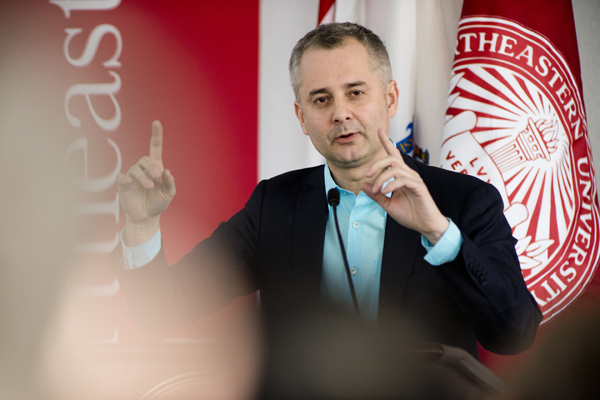Brilliant and motivated, but a good hire?

The evidence is clear that Albert László Barabási, a world-renowned network scientist and Distinguished University Professor of Physics at Northeastern University, has enjoyed a successful career. As the founding professor of Northeastern’s network science program, Barabási is a “brilliant and motivated” scholar, in the words of his graduate advisor, Gene Stanley, himself a distinguished professor of physics at Boston University.
Barabási has published four books and 142 papers, which have collectively received more than 100 thousand citations. He’s even got a Kevin Bacon number of one, thanks to his appearance alongside the Hollywood actor in a movie called “Connected,” according to Larry Finkelstein, dean of the College of Computer and Information Science. As Murray Gibson, dean of the College of Science, put it, “you can’t hide from the obvious impact of his work.”
But on Monday at a ceremony installing him as the inaugural Robert Gray Dodge Professor of Network Science, Barabási asked whether all these accolades actually made him a good hire back in 2007.
In his inaugural lecture that focused on the “science of success,” Barabási noted the measures are consistently used to determine a researcher’s success in the scientific community: a journal’s impact factor and a paper or researcher’s total citation count. “We love to hate these numbers,” explained Barabási, because they don’t actually do a very good job of predicting the future impact of a paper or success of a career.
In a new line of research for his lab, Barabási’s team is developing a more mathematically robust way of measuring success. They’ve examined it in the context of physics research papers and are beginning to expand it into other broad-ranging areas, including the success of a Twitter feed.
Thankfully to those in attendance Monday who hired him seven years ago, Barabási can use these methods to predict continued success for his own career.

President Joseph E. Aoun and Stephen W. Director, Provost and Senior Vice President for Academic Affairs, presented Distinguished Professor of Physics Albert László Barabási with a medal recognizing his installment as the inaugural Robert Gray Dodge Professor of Network Science. Photo by Brooks Canaday.
While a researcher’s single blockbuster success often comes in his or her first 10 years on the job, there is actually no predictive value in that timeline for future success. Based on productivity, he said, “we can’t see success coming nor do we really learn from it.”
Instead, things like an individual’s “excellence parameter”—a measure of how he compares to his peers in the way he addresses the world’s challenges—is much more important than their total citations, the impact of the journals they publish in, or even their overall productivity. We can find an accurate measure of success, Barabási said, “you just have to look at the right variables.”
In closing remarks, Stephen W. Director, provost and senior vice president for academic affairs, noted that Robert Gray Dodge, for whom Barabási’s new professorship is named, was essentially the university’s first professor. “I think it’s fitting that he started something brand new and achieved great success,” said Director, noting that is precisely what Barabási has done since joining the Northeastern faculty and spearheading the nation’s first program in network science.
“One thing I learned through network science,” Barabási said, “is that a network is useless as a set of nodes. It’s all about the links.” Northeastern, he said, has allowed him to pursue those links in order to maintain the high level of work in which his lab is engaged.
President Joseph E. Aoun noted that before commencing his tenure at Northeastern, Barabási demanded only one thing: “an environment conducive to building the best program in the country.” When Aoun asked how he proposed to do that, Barabási said it was simple—just bring in the best people at all levels. “This is what has happened,” Aoun said.
While success may now be accurately measured through complicated mathematics thanks to Barabási’s work, what matters most may still be the collaborations and links that allow a researcher to sustain such work.





